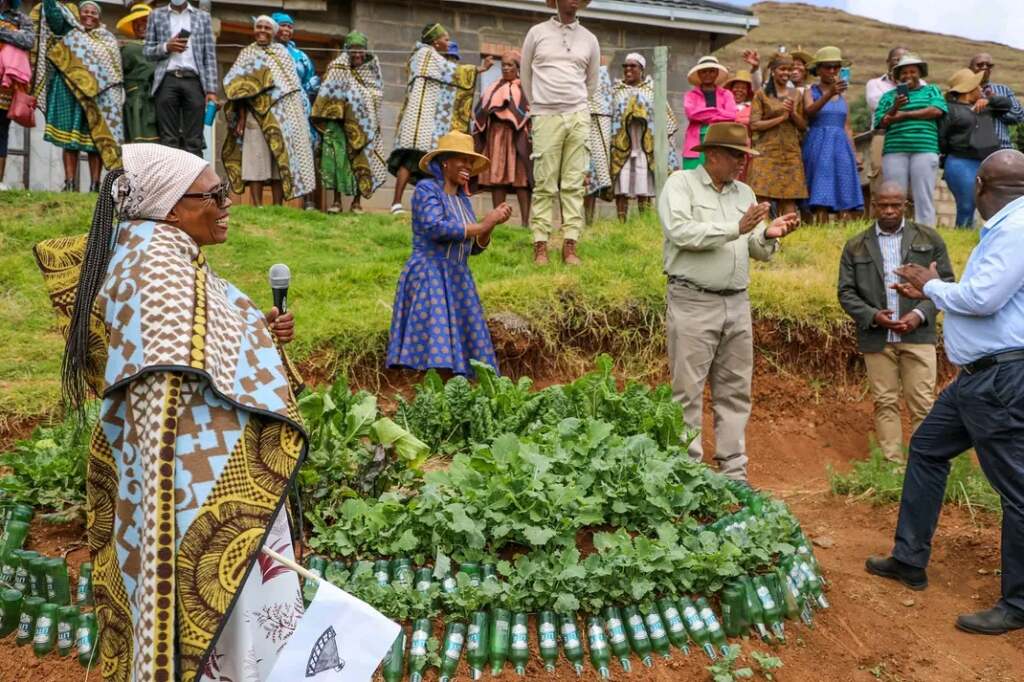Staff Reporter
A pioneering fruit farm initiative in Leribe district has been recommended as a reference point for His Majesty King Letsie III’s flagship project for nutrition.
The horticulture project is considered in line with the King’s vision of fostering sustainable food systems and nutrition progress in Lesotho through private investment in horticulture, in his capacity as the Food and Agricultural Organzation of the United Nation’s (FAO) special goodwill nutrition ambassador and the African Union’s nutrition champion.
“His Majesty has recognised the need to foster sustainable food systems and nutrition progress in Lesotho through private investment in horticulture. The Mahobong horticulture project anchors Lesotho’s plan to accelerate investment in nutrition and coordination to improve nutrition and food security by focusing on one value chain of fruits and vegetables,” said the Principal Secretary of the Ministry of Agriculture, Food Security and Nutrition, Thabo Moleko.
Moleko was speaking during a recent high-level visit of two of the commercial fruit farms in Mahobong, where the King was joined by Prime Minister, Samuel Matekane and three Rome-based senior UN officials among others in touring the orchards.
FAO’s Director General Dr Qu Dongyu, World Food Programme’s (WFP) Assistant Executive Director Valerie Guarnieri, and International Fund for Agricultural Development (IFAD) Associate Vice President for Programme Management, Donal Brown were in the country on the invitation of the King.
“The proposed name for his majesty’s flagship project is promoting Small and Medium Scale private sector processing plants for horticulture specifically in fruits and vegetables,” Moleko added.
The horticulture project has been hailed as a resounding success by, Chaba Mokuku, the project manager of the Competitiveness and Financial Inclusion (CAFI), a follow-up to the Private Sector Competitiveness and Economic Diversification Project (PSCEDP) of the government through the financial support of the World Bank, which birthed the fruit farms.
Established in 2007, The key mandate of the PSCEDP project was to facilitate private sector investment in Lesotho by improving the business environment and by diversifying sources of growth for Lesotho’s economy. The PSCEDP II was re-launched in 2013 to further amplify the successes of the initial project phase.
The project currently consists of three large commercial fruit farms namely Likhothola (10.7 hectares), Maoa Mafubeli (15.6 hectares) and Likhetlane farm, which spans about 15.1 hectares totaling about 41 hectares, but plans are already in place to roll it out countrywide to increase it to 300 hectares at full scale.
“The three farms have created transformation change on multiple fronts: households and schools around these farms enjoy better nutrition; income levels have improved and families can pay school fees; vendors and retailers are sourcing the product locally, and local logistics and transport companies are also benefiting,” Mokuku said during the tour.
In addition, all the three commercial farms comply with requisite international social, labour and environmental safeguards as they are GLOBAL G.A.P certified, meaning their products penetrate international markets.
“Our fruit is already reaching the South African market. Our interest goes beyond import substitution; our main priority is export market. The country needs the foreign currency.”
Mokuku said they were targeting to increase the horticulture project to 300 hectares over the next four years.
“Since 2023, we have successfully completed two pre-incubation programs for 190 fruits and vegetable farmers. Twelve (12) farmers’ companies will soon be enrolled into full incubation program which will culminate into establishment of 9 additional commercial orchards and two commercial vegetable farms by the end this calendar year. Our target is to establish orchards on at least 300 hectares over the next four years.”
The majestic horticulture project has also been noted for its wider socio-economic impact beyond just agriculture.
“One of the spillovers of this initiative is agricultural tourism. One cannot pass through Mahobong or Likhetlane without a temptation to visit these prominent landmarks.”
Mokhethi Shelile, who is the Minister of Trade, Industry and Business Development, developing the horticulture sector is part of the country’s strategic goals in driving economic transformation.
“This sector is identified for its significant potential to contribute to our economic transformation. This investment is a clear example of how our strategic approach is bearing fruit, literally and figuratively. Furthermore, the horticulture project holds immense potential in promoting Small and Medium Scale sector processing plans for fruits and vegetables.
“This will not only create job opportunities, but also ensure food security and improve nutrition across the country. It is a true testament to our commitment to transforming Lesotho into a producer and export driven economy, paving the way for a bigger and more prosperous future,” he said.

Your Trusted Source for News and Insights in Lesotho!
At Newsday Media, we are passionate about delivering accurate, timely, and engaging news and multimedia content to our diverse audience. Founded with the vision of revolutionizing the media landscape in Lesotho, we have grown into a leading hybrid media company that blends traditional journalism with innovative digital platforms.












